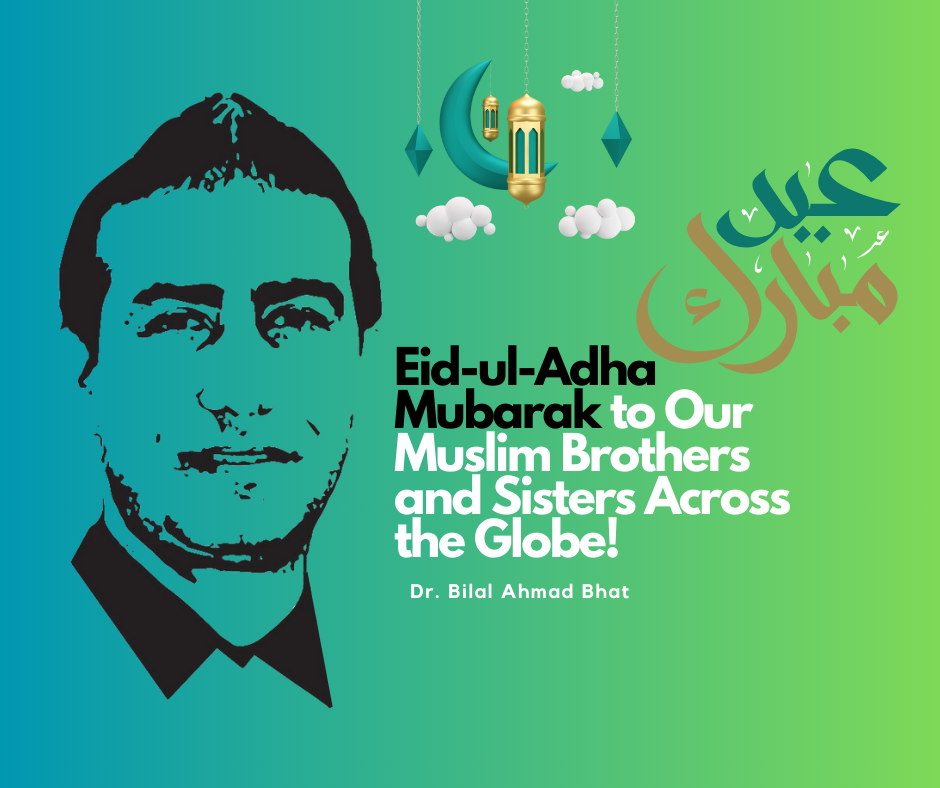Dr. Bilal Ahmad Bhat extends heartfelt wishes to all our Muslim brothers and sisters celebrating Eid-ul-Adha, and to our non-Muslim friends, we wish you a joyous and peaceful holiday!
Understanding Eid-ul-Adha
Eid-ul-Adha, also known as the “Festival of Sacrifice,” is one of the two major Eid celebrations in Islam. The other is Eid-ul-Fitr, which marks the end of the Holy Month of Ramadan. Eid-ul-Adha is considered the greater Eid and follows the completion of the annual Hajj pilgrimage, coinciding with the time of Qurbani (sacrifice).
The Timing of Eid-ul-Adha
The celebration of Eid-ul-Adha falls on the tenth day of Dhu-al-Hijjah, the twelfth and final month of the Islamic Lunar Calendar. The exact date of the celebration is determined by the sighting of the moon, which follows the culmination of the Hajj pilgrimage, a significant obligation for Muslims that is one of the Five Pillars of Islam.
The Significance of Eid-ul-Adha
Eid-ul-Adha commemorates the devotion and faith of Prophet Ibrahim (Abraham) towards Allah SWT. It honors his willingness to sacrifice his beloved son, Ismail (Ishmael), in obedience to Allah’s command. At the moment of sacrifice, Allah SWT, in His infinite mercy, replaced Ismail with a ram to be sacrificed instead. This profound act symbolizes ultimate faith and submission to Allah’s will.
Celebrations and Traditions
Eid-ul-Adha celebrations can last from two to four days, depending on the country. The day begins with Eid Salaah (Eid Prayers), performed in congregation at the mosque. Following the prayers, the act of Qurbani is carried out, where an animal is sacrificed to honor the occasion and in remembrance of Prophet Ibrahim’s test of faith.
The sacrificial animal, known as Udhiya, must be a sheep, lamb, goat, cow, bull, or camel, and should meet specific health and age criteria. The sacrifice is performed in a halal manner. The Qurbani meat is then divided into three portions: one-third for the family, one-third for friends, and one-third for the needy, ensuring that the blessings of Eid are shared with the wider community.
The Spirit of Eid-ul-Adha
Eid-ul-Adha is a time for joy, reflection, and generosity. It is celebrated with family, friends, and loved ones, often marked by wearing new or best clothes and the exchange of gifts. The festival emphasizes the values of sacrifice, charity, and community, bringing people together in the spirit of faith and compassion.
A Message from Dr. Bilal Ahmad Bhat
As we celebrate this blessed occasion, Dr. Bilal Ahmad Bhat encourages everyone to reflect on the lessons of Eid-ul-Adha. It is a time to strengthen our faith, deepen our connections with family and community, and extend our hands in generosity and compassion to those in need.
“May this Eid bring peace, unity, and prosperity to all. Let us embrace the spirit of sacrifice and remember the importance of giving back to our communities. Eid Mubarak to all our Muslim brothers and sisters, and to our non-Muslim friends, we wish you a wonderful holiday season,” says Dr. Bilal Ahmad Bhat.
For more inspiring messages and information, visit www.BilalAhmadBhat.com.
Conclusion
Eid-ul-Adha is a time of profound spiritual significance, communal harmony, and heartfelt generosity. As we gather to celebrate, let us remember the essence of this festival and strive to embody the values it represents in our daily lives. Wishing everyone a joyous and blessed Eid-ul-Adha!




